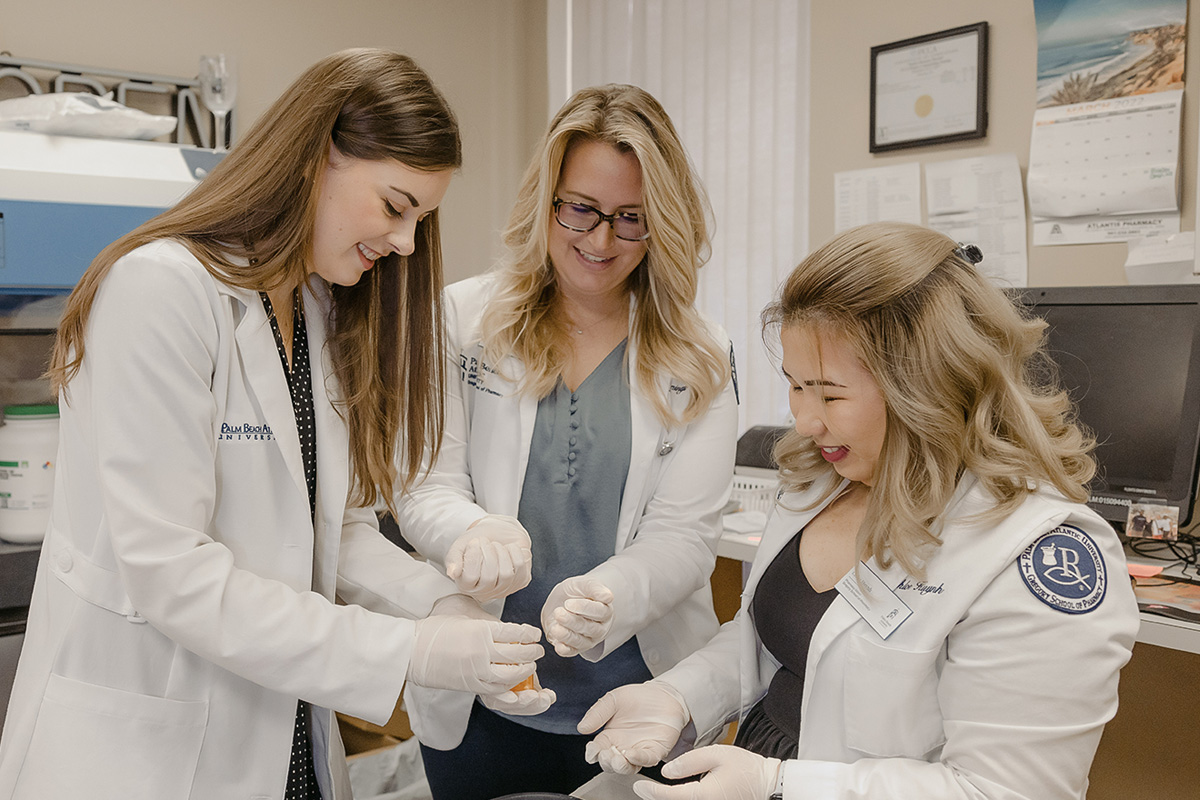Trainings
Community Introductory Pharmacy Practice Experience (IPPE I & II)
The Community Introductory Pharmacy Practice Experience (IPPE) is intended to increase students’ knowledge and understanding of the workflow system in the community setting. The IPPE series is designed to be a practical experience that focuses on the development of students’ professional attitudes, values, and skills. The student will be able to describe the role of the pharmacist and pharmacy support staff in the care of patients in the community setting and the relationship of the pharmacy to other settings. The coursework consists of coordinated, student-regulated, experiential activities based in a community pharmacy setting. Emphasis is placed on reflective, self-directed learning to enable students to demonstrate knowledge of pharmacy workflow and effectively deliver patient-centered care within the realm of community pharmacy by training under the guidance of a pharmacist preceptor in a local community pharmacy.
The IPPE community experience is done in the summer after the successful completion of the P1 curriculum for a total of 160 hours to be done in 4 weeks.
Institutional Introductory Pharmacy Practice Experience (IPPE III & IV)
The Hospital Introductory Pharmacy Practice Experience (IPPE) is intended to increase the student’s knowledge and understanding of drug distribution, the preparation of medications, the control of narcotics, and the flow of medication delivery in the hospital setting. The IPPE series at this juncture is designed to be a continuum of practical experience that focuses on the development of students’ professional attitudes, values, and skills initially cultivated in the previous IPPE experience. The student will observe or participate in the preparation of intravenous admixtures and perform the necessary calculations involved. The student will be able to describe the role of the pharmacist in the care of patients in the hospital setting and the relationship of the pharmacy to other departments.
The IPPE hospital experience is done in the summer after the successful completion of both P1 & P2 curriculum for a total of 160 hours to be done in 4 weeks.
Advanced Pharmacy Practice Experience (APPE)
During the fourth professional year in the pharmacy program, students participate in Advanced Pharmacy Practice Experiences (APPE). These experiences consist of rotations each comprised of 6 weeks, in which students will spend at least 40 hours per week at a facility.
There are four required experiences: ambulatory care, advanced community, advanced hospital practice and general medicine. In addition, you will select three electives geared to your interest preferences (see the list of APPE electives currently offered below).
We place students throughout the state based on rotation availability and student preferences. If students prefer to complete an APPE rotation elsewhere within the United States, this may be approved based on a facility’s ability to provide a unique or celebrated experience in addition to availability for perception.
Current Elective Rotations
- Academia
- Aetna Medicaid – Managed Medicaid DUR
- Anticoagulation
- Association Management
- Bone Marrow Transplant
- Cardiology
- Clinical Research
- Community Administration/Management
- Compounding
- Critical Care
- Diabetes Management
- Drug Information
- Emergency Medicine
- Geriatrics/Long-Term Care
- HIV
- Hospital Administration/Management
- Indigent Care
- Industry
- Infectious Disease/Antibiotic Stewardship
- Investigational Drug Services
- Mail Order
- Managed Care/PBM
- Medical Writing
- Medication Safety
- Medication Therapy Management
- Missions
- Neurosciences
- NICU/Mother Baby
- Nuclear
- Nutrition
- Oncology
- Ownership Community
- Pain Management/Palliative Care
- Pediatrics
- Pediatric Intensive Care
- Pediatric Nephrology
- Pediatric Oncology
- Pharmaceutical Research
- Pharmacogenomics
- Pharmacy Informatics
- Pharmacy Law
- Psychiatry
- Specialty Pharmacy
- Sports Pharmacy
- Surgery
- Toxicology
- Transitions of Care
- Transplant
- Women’s Health
